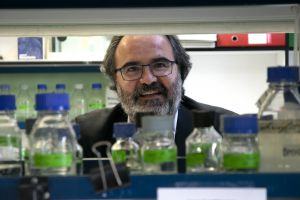Montoliu es experto en la metodología de edición genómica y ha sido pionero en la implantación de las técnicas CRISPR-CAS de edición genética en España. Sus investigaciones más recientes se centran en la identificación de elementos cromosómicos que actúan como aislantes de regiones genómicas, y en la generación de sistemas modelos en ratón para el estudio del albinismo, donde es un referente nacional e internacional. Ha publicado alrededor de 200 artículos científicos, que han recibido más de 4.000 citas.
Además, Montoliu ha sido promotor del acuerdo COSCE de Trasparencia en Experimentación Animal que hoy cuenta con 159 sociedades adheridas y uno de los impulsores y es un miembro destacado de la red de Comités de Ética española, que desempeña un papel esencial en la investigación biomédica del Centro de investigación biomédica en Red de enfermedades raras (CIBERER).
No solo eso, durante los últimos diez años, suma a su actividad investigadora una extensa y continua actividad de divulgación y comunicación científica tanto en prensa, como en radio, blogs, YouTube y redes sociales. En el año 2018 recibió el premio SINCronizados de la agencia SINC como reconocimiento a su implicación en la comunicación de la ciencia y su disponibilidad a la hora de ampliar, opinar o profundizar un tema, especialmente en noticias que han tenido una gran relevancia informativa. Durante la pandemia reactivó su canal personal de YouTube divulgando sobre diversos aspectos de la genética utilizando piezas de colores de un juego de construcción (TENTE) que sigue actualizando.
El jurado de la presente edición ha destacado su intensa actividad de divulgación sobre edición genética, enfermedades raras, albinismo, experimentación animal y bioética. También hacen una mención especial al impacto de dos de sus libros de divulgación sobre enfermedades raras (Genes de colores, de la editorial Next Door Publishers) y sobre las bases genéticas del albinismo (El albinismo, de la editorial Los libros de la Catarata), sin olvidar su labor de educación y difusión de la ciencia en numerosos Institutos de Educación Secundaria de diversas comunidades autónomas españolas.
El Premio COSCE a la Difusión de la Ciencia cumple 15 años
Desde 2007, el Premio COSCE a la Difusión de la Ciencia reconoce la contribución de miembros destacados de la comunidad científica en la tarea de difundir el conocimiento y está dotado con 3.000 euros. El jurado de este año está formado por la presidenta de la COSCE Perla Wahnón y los científicos José María Bermúdez de Castro y Rafael Garesse Alarcón.
Prestigiosos investigadores han recibido este galardón de COSCE, que cuenta con la colaboración de la Fundación Ramón Areces, y que pone de manifiesto el compromiso de COSCE con la divulgación científica.
Entre los premiados se encuentran el microbiólogo Ignacio López Goñi, el químico Gabriel Pinto Cañón en 2020; la fundadora y presidenta de la Asociación Apadrina la Ciencia, Carmen Simón en 2019; el químico y autor de “Historia del futuro. Tecnologías que cambiarán nuestras vidas”, Amador Menéndez Velázquez en 2018, y la matemática y conocida divulgadora Clara Grima en 2017. Anteriormente, también han sido premiados el paleontólogo Juan Luis Arsuaga en 2012, los biólogos Francisco José Ayala en 2009 y Pere Puigdomènechen 2013, y el divulgador científico, investigador y gestor de política científica, Emilio Muñoz Ruiz en 2014.






